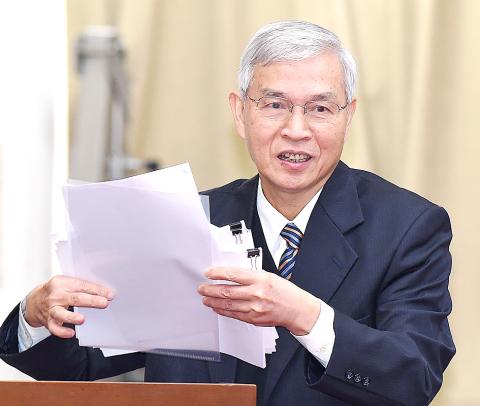Central bank Deputy Governor Yang Chin-long (楊金龍) has reportedly won the nomination as the nation’s top monetary policymaker after Governor Perng Fai-nan (彭淮南) retires on Feb. 25.
In an exclusive report yesterday, the Chinese-language Liberty Times (the sister newspaper of the Taipei Times) broke the news, which is consistent with market expectations.
The long-awaited appointment, which still requires confirmation from the Presidential Office and the Executive Yuan, would make Yang the central bank’s first deputy to become governor.

Photo: Liao Chen-huei, Taipei Times
He is expected to extend Perng’s “dynamic stability” approach in dealing with foreign exchange.
Yang, 64, who earned his doctoral degree in economics from the University of Birmingham in 1989, served in the central bank’s research, foreign exchange and banking departments, and was its representative in its London office, before becoming deputy governor in 2008.
His purported appointment appears to be a safe call, as he is familiar with the central bank’s duties and operations, and would help stabilize the foreign exchange market, Taiwan Institute of Economic Research (台灣經濟研究院) economist Gordon Sun (孫明德) said.
“It is time the central bank sends foreign funds a message that it will not sit around tolerating drastic appreciations of the local currency,” Sun said.
Foreign exchange policy represents the No. 1 challenge for the next governor, as it has a profound bearing on Taiwan’s export-reliant economy, he said.
The New Taiwan dollar has gained 2.5 percent against the US dollar this year after picking up 8.14 percent last year.
In a rare move, the central bank on Thursday blamed the greenback’s volatility on interventions by the administration of US President Donald Trump.
US Secretary of the Treasury Steven Mnuchin on Wednesday told the World Economic Forum in Davos, Switzerland, that a weaker US dollar is in the interest of the US as it relates to trade, the central bank said in a statement.
Mnuchin’s predecessors believed in a strong greenback to advance the same purpose, it added.
“While it is impractical to battle the global trend, the central bank can still weigh in and slow the pace to allow local firms some buffers,” Sun said.
Foreign exchange losses last year totaled NT$176.1 billion (US$6.05 billion) for domestic life insurance companies alone, eroding their profits by 60 percent, Financial Supervisory Commission data showed.
Chung-Hua Institution for Economic Research (中華經濟研究院) head economic researcher Liu Meng-chun (劉孟俊) said the most formidable challenge for Yang would be to continue the central bank’s independent operation, which many have attributed to Perng’s professional and personal prestige.
Perng has been rated as one of the world’s top-tier central bankers by New York-based magazine Global Finance for 14 consecutive years and last week won a lifetime achievement award from global Central Banking Publications.
“It remains to be seen if Yang, a long-standing loyal deputy governor, can step out of Perng’s shadow and command support from ruling and opposition camps for his policy decisions,” Liu told the Taipei Times.
To avoid controversy, Yang might take cues from Perng and put economic stability ahead of corporate profitability, Liu said.

SECURITY: As China is ‘reshaping’ Hong Kong’s population, Taiwan must raise the eligibility threshold for applications from Hong Kongers, Chiu Chui-cheng said When Hong Kong and Macau citizens apply for residency in Taiwan, it would be under a new category that includes a “national security observation period,” Mainland Affairs Council (MAC) Minister Chiu Chui-cheng (邱垂正) said yesterday. President William Lai (賴清德) on March 13 announced 17 strategies to counter China’s aggression toward Taiwan, including incorporating national security considerations into the review process for residency applications from Hong Kong and Macau citizens. The situation in Hong Kong is constantly changing, Chiu said to media yesterday on the sidelines of the Taipei Technology Run hosted by the Taipei Neihu Technology Park Development Association. With

CARROT AND STICK: While unrelenting in its military threats, China attracted nearly 40,000 Taiwanese to over 400 business events last year Nearly 40,000 Taiwanese last year joined industry events in China, such as conferences and trade fairs, supported by the Chinese government, a study showed yesterday, as Beijing ramps up a charm offensive toward Taipei alongside military pressure. China has long taken a carrot-and-stick approach to Taiwan, threatening it with the prospect of military action while reaching out to those it believes are amenable to Beijing’s point of view. Taiwanese security officials are wary of what they see as Beijing’s influence campaigns to sway public opinion after Taipei and Beijing gradually resumed travel links halted by the COVID-19 pandemic, but the scale of

A US Marine Corps regiment equipped with Naval Strike Missiles (NSM) is set to participate in the upcoming Balikatan 25 exercise in the Luzon Strait, marking the system’s first-ever deployment in the Philippines. US and Philippine officials have separately confirmed that the Navy Marine Expeditionary Ship Interdiction System (NMESIS) — the mobile launch platform for the Naval Strike Missile — would take part in the joint exercise. The missiles are being deployed to “a strategic first island chain chokepoint” in the waters between Taiwan proper and the Philippines, US-based Naval News reported. “The Luzon Strait and Bashi Channel represent a critical access

Pope Francis is be laid to rest on Saturday after lying in state for three days in St Peter’s Basilica, where the faithful are expected to flock to pay their respects to history’s first Latin American pontiff. The cardinals met yesterday in the Vatican’s synod hall to chart the next steps before a conclave begins to choose Francis’ successor, as condolences poured in from around the world. According to current norms, the conclave must begin between May 5 and 10. The cardinals set the funeral for Saturday at 10am in St Peter’s Square, to be celebrated by the dean of the College